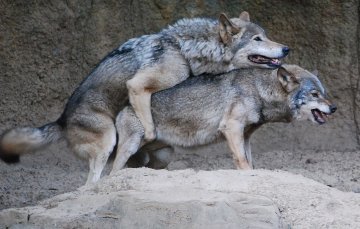Wolf Reproduction
 Wolf reproduction is different when compared with other species of animals. Their adulthood begins when they reach two years of age. At that point, the males can mate with the females, but this does not happen for all of them.
Wolf reproduction is different when compared with other species of animals. Their adulthood begins when they reach two years of age. At that point, the males can mate with the females, but this does not happen for all of them.
Social Hierarchy and Reproduction
Social hierarchy within a pack is the main reason why not all wolves get to mate and have offspring. Only the Alpha male gets to do so. His status is earned trough domination and it is accepted by the entire pack.
The rest of the wolves might never get the chance to have their own offspring. Even in packs that have more than one female, only the Alpha will mate with them. This is one of the main reasons why the wolf population is decreasing.
Food and Reproduction
Recent research revealed another factor that influences the reproduction habits of wolves. Food scarcity can determine if the Alpha male and the Beta female will mate. When there is not enough food, the pack will not have young pups to take care of.
This can become a burden for small packs especially when a single female gives birth to six or more pups. On average, a female can give birth to four to six pups and in some rare cases, it can even go beyond 10.
Nursing the Offspring
Wolves mate only once a year. This usually happens between the months of January and March. Even if the parents are the Alpha male and Beta female, the entire pack takes responsibility to take care of the pups.
Since they are very vulnerable at birth, the mother will feed them with milk and stay with them for their first month of life. During that time, they will not leave the den. Once strong enough, they will emerge from the den with their mother.
Until the moment they are strong enough, the pack will take care of the pups. The members will take turns to guard the offspring while the rest are hunting. Their survival becomes the main focus of the entire pack.
However, even if they are being taken care of by all the members, half of the pups do not survive their first year of existence. The mother’s nutrition during her pregnancy will influence their health and some of them can be very small at birth. Also, food scarcity for the pack translates into less food for the pups.
